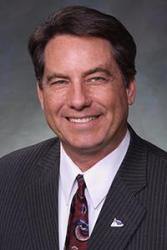Funding for high-speed rural broadband may finally move forward in Legislature

This week, a bill that could strike a grand bargain for rural broadband gets its first hearing in the Colorado Senate.
Senate Bill 18-002 may finally move the state forward on the issue of rural broadband, one that has stymied lawmakers since 2011. Several efforts to find ways to pay for high speed internet have failed to achieve what lawmakers have hoped for, so the hearing could set the stage for success.
Senate President Pro tem Jerry Sonnenberg of Sterling and Sen. Don Coram of Montrose, both Republicans, are the chief sponsors of the measure. It would transfer the state’s High Cost Support Mechanism, a fund originally designed to subsidize the cost of telephone service in underserved areas, to another fund that would subsidize broadband build-out.
The HCSM is paid for by all phone users, as a surcharge on landline or cell service, usually identified as a Universal Service Charge. It’s 2.6 percent and is billed on phone or voice usage, not on data.
For years, CenturyLink has been the biggest beneficiary of that subsidy, as the state’s phone provider of last resort, which means they have to provide phone service wherever it is needed.
A recent report by the Public Utilities Commission, which administers the fund, pointed out revenues to the HCSM are on the decline as consumers increasingly move away from landlines. In 2017, the fund took in $36.1 million, compared to $38.7 million the previous year. The PUC expects that decline to continue.
In 2014, the General Assembly, through its telecom reform package, decided to split the purpose of the HCSM into two: to continue subsidizing landline service and to start covering some of the costs of broadband. But two lawsuits from CenturyLink and Viaero tied up the transfers to the HCSM. The CenturyLink lawsuit was resolved in 2015; the Viaero case is still in the courts.
In 2017, the PUC report said just $9.4 million was available to transfer to the state’s broadband deployment fund.
SB 2 would speed up those transfers, taking 20 percent of the available dollars every year until the fund fully transfers to broadband, which should happen around 2024, according to Sonnenberg.
“This bill may be the best opportunity for rural Colorado to be participants rather than spectators in our state’s economy,” Coram told Colorado Politics recently.
While the bill has strong bipartisan support (Democratic House Majority Leader K.C. Becker of Boulder will carry it in that chamber), CenturyLink is still opposed to the measure, although Mark Soltes, a vice president for public policy and government affairs at CenturyLink said recently, “We like the idea of broadband, and we want to build it out, too.”
The company’s issue with the bill is that the transfers will come directly out of the dollars that would normally go to CenturyLink, which receives the vast majority of those funds.
The full article is available in our e-Edition. Click here to subscribe.
